Yüksekdağ Şenoğlu and Others v. Turkey, Nos. 14332/17 and 12 others, ECtHR (Second Section), 8 November 2022

The Second Section of the European Court of Human Rights recently ruled on the applications lodged by thirteen Turkish nationals, elected in 2015 to the Grand National Assembly as representatives of the pro-Kurdish Peoples’ Democratic Party (HDP), who had been placed and maintained in pre-trial detention purportedly on account of political speeches they had given.
Following in the footsteps of its own case law on the matter – and especially of the case of Selahattin Demirtaş, the HDP leader suffering prolonged pre-trial detention and criminal proceedings initiated against him –, the Court found the violation of a range of ECHR provisions such as Article 10 (right to freedom of expression), Article 5 (right to liberty and security, and to a speedy decision on the lawfulness of detention), Article 1 of Protocol no. 1 (right to free elections), and Article 18 (limitations on use of restrictions on rights).
Noticing that remarks of a political nature made by leaders of one of the main opposition parties cannot per se be considered sufficient to justify provisional detention for serious terrorism-related offenses, the ECtHR also recalled the 2017 Commissioner for Human Rights memorandum on freedom of expression and freedom of the media in Turkey, which had defined the deprivation of liberty of HDP deputies as part of a judicial policy of “recourse to judicial harassment to restrict parliamentary debate”. According to the ECtHR, the detention on remand suffered by the applicants pursued an unavowed aim, namely that of stifling pluralism and limiting the free play of debate politics, which lies at the very heart of the notion of a democratic society. This decision is one of the latest examples of an ever-increasing case law enhancing the ECtHR’s role as a stronghold of political pluralism before the challenges that the latter finds in some legal orders, such as the Turkish one.
(Comment bu Marco Galimberti)

